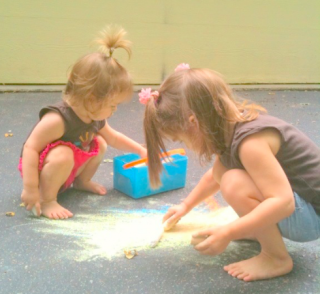Extroversion
Toddler Temperament and the Gut
Do bacteria in the gut influence behavior in kids?
Posted September 5, 2015

This spring and summer brought many exiting new studies teaching us more about the gut-brain connection. New links have been found between gut bacteria composition and depression, cognition, temperament, and even throat swab differences between patients with schizophrenia and those without. Before we get too giddy about the idea of healing all problems with bespoke probiotics…let’s just say that when you have 20-100 trillion microbes interacting in unknown ways with your immune system and each other, the data signals we get can only be characterized as “it’s complicated.” Nevertheless, the brave researchers and their handy computers pick through it and see what wisdom can be gleaned.
One study that made a big splash in the headlines came from my favorite medical journal, Brain, Behavior, and Immunity, “Gut microbiome composition is associated with temperament in early childhood.” Researchers got stool samples from seventy-nine 18-27 month-old children (not a particularly difficult endeavor in my experience) and asked their moms to fill out an “Early Childhood Behavior Questionnaire.” While scales aren’t perfect by any means, this one can give a general idea of the toddler’s temperament, specifically how negative the kid’s emotions tend to be, how likely he is to be more brave and extroverted, and how good the child is at containing himself. The data was broken down by sex as girls and boys by that age tend to rate differently.
Other data measured included breastfeeding duration, age at when cereals and fruits/vegetables were introduced, meal patterns, and current diet. All sorts of things can influence the composition of the microbiota, which is more flexible before two years of age. Breastmilk in particular has loads of sugars called oligosaccharides whose main purpose is to feed the baby’s microbiome, and breastmilk also has actual probiotics within it. Antibiotics can deplete the microbiome, and changes in diet can quickly reduce or increase diversity, depending on the dietary content. Whether or nor a kid is born by c-section makes a difference as well.
That’s a lot of factors to take into account, and when it comes down to what the researchers discovered, they linked greater diversity of the microbiota to higher ratings of positive emotions and extroversion in boys and girls. Since greater microbial diversity (think a wildly populous rainforest versus a few lizards scrambling around in a desert) is linked with greater health in general, this finding is not a great surprise, though you might be wondering what it is those microbes are doing to make children be so happy, comfortable, and outgoing. While we can’t determine from this study whether happy kids make a better gut or a better gut leads to happier kids, from animal studies we know the arrow of causality goes both ways. Mice taken from their moms and stressed out have a less diverse microbiome, and mice behavior can also be changed by mucking around with the bacteria in their guts.
In boys, the researchers were able to link the presence of certain species of microbes with extraversion, but this finding did not hold for the girls. In general, these little boys were found to be more extroverted, and girls tended to be able to contain themselves better, which is consistent with toddler research in general. The composition of the gut microbiome wasn’t linked to differences in diet or duration of breastfeeding in this sample of kids, but the researchers themselves admit they didn’t measure current diet very carefully. Clearly further studies with a larger population and more specific dietary data gathering would help answer some of the questions we have left.
We know that the microbiota can influence human health in three major ways: direct communication (yes, they are whispering to you via your vagus nerve), hormonal, and immune system effects. It stands to reason these same pathways would exist in toddlers too. Supporting the gut diversity of a toddler with good lifestyle habits including lots of sleep, plenty of play outdoors, healthy food, and avoiding antibiotics unless necessary is a great way to make both your toddler and his gut as happy and healthy as can be.

Copyright Emily Deans MD


